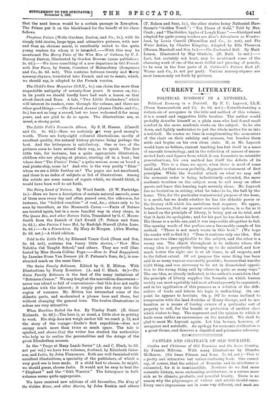CURRENT LITE RAT UR E.
POLITICAL ECONOMY IN A NUTSHELL. Political Economy in a Nutshell. By F. U. Laycock,- LL.B. (Swan Sonnenschein and Co. 2s. 6d. net.)—Notwithstanding certain air of arrogance in the title and method of this volume, it is a sound and suggestive little treatise. The author would probably describe himself as a plain man who had found small comfort in the more academic works on the subject. So he sits down, and lightly undertakes to put the whole matter for us into a nutshell. He wastes no time in complimenting the economists of the chair on their subtlety and acumen, but brushes them aside and begins on his own clean slate. If, as Mr. Laycock would have us believe, current teaching has lost itself in a maze of uncouth terminology, and in the collection of masses of uncon- nected facts and figures from which it can formulate no scientific generalisations, his own method has itself the defects of its quality. This is a time, we agree, when there is need of some lucid and, for that reason probably, dogmatic restatement of first principles. While the Socialist attack on what we may call the economic order is being industriously extended, the more academic treatises on the subject seem to sail away on other quests and leave this burning topic severely alone. Mr. Laycock has no hesitation in seizing, what he takes to be, the bull by the horns. This, for the particular controversial purpose of the hour, is a merit, but we doubt whether he has the didactic power or the literary skill which his ambitious task requires. He appre- hends, however, that our present economic system, in so far as it is based on the principle of liberty, is being put on its trial, and that it lacks its apologists ; and for his part he has done his best. His theme is a noble one, and it was impossible altogether to fail. The opening words of the preface are a favourable sample of his method. "There is not much wa.sto in this book." (We hope the reader will so find it.) "True it contains only one idea. But there are two id.ens applicable to the subject, and the other is a wrong one. The object throughout is to indicate where the wrong idea is perpetually turning up to do mischief, and how much better the right one is at all times, in all respects, and to the fullest extent. Of set purpose the same thing has been said in as many ways as reasonably possible ; because that was the right thing, and was necessary to be set in diametrical opposi- tion to the wrong thing said by others in quite as many ways." The one idea, as already indicated, is the author's conviction that the principle of liberty supplies the formula on which human society can most equitably and most advantageously be organised ; and in his application of this panacea as a solution of the diffi- culties of trade and labour his logic is unflinching. On one point he appears to hesitate. On p. 187 he seems inclined to compromise with the land doctrine of Henry George, and to use taxation as a means of forcing owners of a particular sort of property to sell, for the benefit or protection of another class which wishes to buy. The argument and the opinion to which it leads seem rather an excrescence on the nutshell. We shall be glad to meet Mr. Laycoek again. Let him beware, however, of arrogance and nutshells. An apology for economic civilisation is a great theme, and deserves a dignified and persuasive advocacy.






























































 Previous page
Previous page